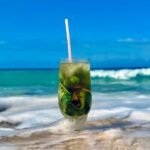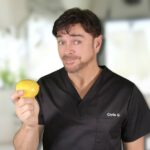Written By: Olivia Liveng
While glamorizing the hot weather, beach time, and vacations with families are the fun topics we love to talk about during summer, it is essential to remember to take care of our health in changing environments. And this includes eye health.
Yes, in addition to sunburns and dehydration, getting too much sunshine in the summer can also lead to multiple eye problems, from dry eyes to headaches to eye disease caused by UV rays. This is because the sun’s light during summer can be extreme, leading to sensitivity and more significant issues in all eyes. Very similar to staring at your screen for too long, the sun also emits blue light, a high-energy component of visible light.
And no, we cannot walk around with the latest trending pair of blue light glasses all summer as some do while working on their laptops. But there is a more straightforward solution to improving our eyes and eye health, especially in the summertime. And that is choosing what you’re eating carefully, as ultimately, optimal health comes from within our bodies and how we care for them.
Your (Eyes) Are What You Eat
That’s right. Adding certain foods to your diet could also promote eye health and limit eye problems caused by the sun’s rays. Most importantly, two nutrients, Lutein and Zeaxanthin, can help protect your eyes against the harmful effects of this blue light energy.
The names of these nutrients may sound quite complicated, but they are actually much more accessible than you would believe. In fact, we have a list of eight of the best foods you can incorporate into your diet to protect your eyes–from both sunshine to screentime! They are:
- Oranges, grapefruit, citrus, try papaya!
- Dark Leafy greens
- Sunflower seeds
- Omega 3 fatty acids
- Avocado
- Raspberries
- Watermelon
- Peppers (like red peppers)
- Nuts and Seeds
Where’d All The Zeaxanthin and Lutein Go?
Unfortunately, however, the American diet is still scarce on Zeaxanthin and Lutein, even with knowing they are in so many foods. While eating corn on the cob, for example, is good for the eyes and part of the average American barbeque, one would have to eat about 20 ears of corn to get the amount of dietary Zeaxanthin that eyes need.
Hence, a small predicament. The solution? Vitamins and minerals such as EyePromise’s Zeaxanthin + Lutein. EyePromise, the #1 doctor-recommended line of eye vitamins mostly used by pro sports organizations like the Boston Red Sox and the PGA, is growing in popularity, and more dietitians and sports dietitians are recommending them to their patients. This particular formula was created with dietary ingredients in the amounts necessary to build and support one’s natural eye protection, and it’s perfect for people looking to add an eye-healthy vitamin to their daily vitamin regimen (and yes, suitable for both vegans and vegetarians!)
“When estimating average daily dietary intake, we found that most people, regardless of sex or ethnicity, obtain less than 1.2mg of Lutein and less than 0.12mg of Zeaxanthin,” explained Dr. Pinakin Davey, OD, PhD, FAOO. “Those levels are far below the quantities that are beneficial to support healthy vision. The body doesn’t make these important nutrients on its own, so I suggest for my patients to turn to nutrition to sustain the necessary amounts. Zeaxanthin can be found in brightly colored vegetables like orange bell peppers and paprika peppers,” said Dr. Davey.
Lutein is also scarce in the American diet, with the average person getting 0.5-1 mg a day with the recommendation being at least 8 mg. Lutein can be found in leafy greens like spinach, kale, and broccoli. While this antioxidant is more prevalent in the diet than Zeaxanthin, it can still be difficult to get the amounts necessary to support eye health.
Benefits of EyePromise Zeaxanthin + Lutein
Okay, while you won’t yet have superhuman powers after taking EyePromise Zeaxanthin + Lutein for three months, your eyes will be pretty darn close! You’ll have enhanced visual acuity, meaning you may find yourself seeing details easier or being able to read certain signs from further away than before.
You also may notice that you can more easily discern that the dark figure in the distance is one of those metal statues rather than a real person during the evening (and that’s called contrast sensitivity!) If you have more confidence driving amongst the bright headlights at night with fewer problems, you may have decreased your light and glare sensitivity, which is crucial for night driving safety.
Lastly, you may also notice that your vision in low light has drastically improved (aka, it’s easier for you to read the menu in that restaurant with the unusually dark mood lighting, huzzah!) And most of all, the products protect and serve as “internal sunglasses for your eyes,” which is how most pro baseball players catching fly balls and PGA Champions like Padraig Harrington refer to the vitamins. “Not only will Zeaxanthin and Lutein help enhance vision quality, but these supplements found in our natural and NSF Certified for Sport eye vitamins will help block the harmful blue light that can damage the eyes over time,” explains Andreas Wolf, the President of EyePromise.
















